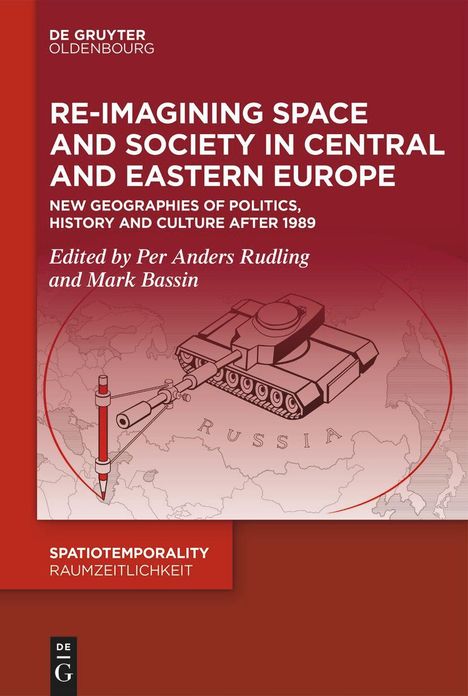Re-Imagining Space and Society in Central and Eastern Europe, Gebunden
Re-Imagining Space and Society in Central and Eastern Europe
- New Geographies of Politics, History and Culture after 1989
(soweit verfügbar beim Lieferanten)
- Herausgeber:
- Mark Bassin, Per Anders Rudling
- Verlag:
- de Gruyter Oldenbourg, 12/2025
- Einband:
- Gebunden
- Sprache:
- Deutsch, Englisch
- ISBN-13:
- 9783119148443
- Artikelnummer:
- 12324298
- Umfang:
- 280 Seiten
- Sonstiges:
- 9 b/w illustrations, 0 b/w tbl.
- Erscheinungstermin:
- 16.12.2025
- Serie:
- SpatioTemporality / RaumZeitlichkeit
Klappentext
The end of what the GDR called "real existierender Sozialismus" in Europe at the beginning of the 1990s dramatically changed the geopolitical situation in Central and Eastern Europe. Five states ceased to exist, whereas 22 new states have been recognized, accompanied by a host of internationally unrecognized states. Nearly half a century of relative stability in Europe was replaced by volatility and insecurity.
These geopolitical transformations were accompanied by a fundamental revalorization of political space and the rehabilitation of long-forgotten spatial symbolisms and geopolitical imaginations, from legacies of the Polish-Lithuanian Commonwealth, concepts of Mitteleuropa, the Saisonsstaaten of 1918, to neo-imperial concepts of the "Russian world" and pan-Turkic neo-Ottomanism. The Russian annexation of Crimea in 2014 and the full-scale assault on Ukraine in 2022 constitute a return of massive imperial violence, rhetorically justified by an intensely political rewriting of history, invoking the imperial past to justify aggression. Legacies of the historical past, which until recently were curiosities, little known beyond smaller groups of specialists, now formed a casus belli.
The volume, addressing scholars and others concerned with today's Europe, contains four sections: its opening section on imperial spaces engages Russia's attempts at "renegotiate" the international political order, an end of liminality in a Russia which "knows no boundaries" (thus Putin). It is followed by a section on the construction of spatial identities on the basis of the Russian Federation leadership's "renegoting" its liminality. Section three engages the repositioning of Eastern Europe in the wake of Russia's departure from the international, rule-based legal order. The final section inquiries into the ideological underpinnings of "re-negotiated" geopolitical imaginaries of both perpetrators and victims of this re-imagination of empires.
Anmerkungen:
Bitte beachten Sie, dass auch wir der Preisbindung unterliegen und kurzfristige Preiserhöhungen oder -senkungen an Sie weitergeben müssen.
Mehr von SpatioTemporali...
-
Fairs, Cities and MerchantsBuchAktueller Preis: EUR 89,95
-
Nevin Gürbüz-BlaichReal and Imaginary Spaces in Tom Stoppard's PlaysBuchAktueller Preis: EUR 79,95
-
Spaces for DiplomacyBuchAktueller Preis: EUR 74,39
-
Maryam RahmaniSpatiotemporal Politics in Contemporary IranBuchAktueller Preis: EUR 59,95





